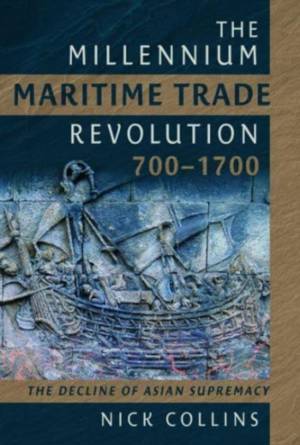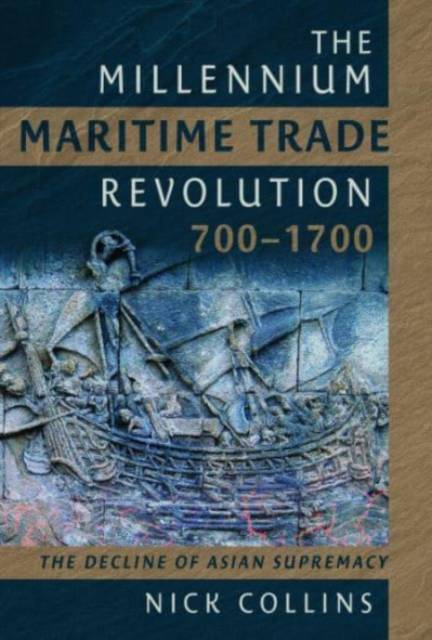
- Afhalen na 1 uur in een winkel met voorraad
- Gratis thuislevering in België vanaf € 30
- Ruim aanbod met 7 miljoen producten
- Afhalen na 1 uur in een winkel met voorraad
- Gratis thuislevering in België vanaf € 30
- Ruim aanbod met 7 miljoen producten
Zoeken
The Millennium Maritime Trade Revolution, 700-1700
How Asia Lost Maritime Supremacy
Nick Collins
Hardcover | Engels
€ 48,95
+ 97 punten
Omschrijving
This book explains how and why and how destructive continental influences destroyed Asia's maritime supremacy.
Following the series' first book How Maritime Trade and the Indian Subcontinent Shaped the World, this book continues to demonstrate how maritime trade has been the key driver of the world's wealth-creation, economic and intellectual progress.
The story begins where the first book ends, when following Roman Empire collapse, 7th-century European maritime trade almost ceased, creating population collapse and poverty; the Dark Ages. In 700, stuttering, hesitant recovery was evident with new ports but Viking and Muslim maritime raiding neutered recovery until the 11th century. In Asia by contrast, short and long-haul trade thrived and accelerated from east Africa and the Persian Gulf all the way to China, encouraging Southeast Asian state formation.
The book tells the story of slowly rising, gradually accelerating European maritime trade, which until the 15th century was overshadowed by far more voluminous Asian trade in much larger, more complex ships traded by more sophisticated commercial entities, contributing to innovative tolerant wealth-creating maritime societies. In Europe, Mediterranean maritime trade made most progress from about 1000 to 1450. But by 1700, north Europeans dominated Atlantic, American and Mediterranean trade and were penetrating sophisticated Asian maritime networks, a complete reversal.
This book explains how and why and how destructive continental influences destroyed Asia's maritime supremacy. As in the first book, Nick Collins finds similar patterns; maritime inquisitiveness, invention, problem-solving and toleration and continental political suppression of those maritime traits, most dramatically in China, but destructively everywhere, allowing the millennium maritime trade revolution.
Following the series' first book How Maritime Trade and the Indian Subcontinent Shaped the World, this book continues to demonstrate how maritime trade has been the key driver of the world's wealth-creation, economic and intellectual progress.
The story begins where the first book ends, when following Roman Empire collapse, 7th-century European maritime trade almost ceased, creating population collapse and poverty; the Dark Ages. In 700, stuttering, hesitant recovery was evident with new ports but Viking and Muslim maritime raiding neutered recovery until the 11th century. In Asia by contrast, short and long-haul trade thrived and accelerated from east Africa and the Persian Gulf all the way to China, encouraging Southeast Asian state formation.
The book tells the story of slowly rising, gradually accelerating European maritime trade, which until the 15th century was overshadowed by far more voluminous Asian trade in much larger, more complex ships traded by more sophisticated commercial entities, contributing to innovative tolerant wealth-creating maritime societies. In Europe, Mediterranean maritime trade made most progress from about 1000 to 1450. But by 1700, north Europeans dominated Atlantic, American and Mediterranean trade and were penetrating sophisticated Asian maritime networks, a complete reversal.
This book explains how and why and how destructive continental influences destroyed Asia's maritime supremacy. As in the first book, Nick Collins finds similar patterns; maritime inquisitiveness, invention, problem-solving and toleration and continental political suppression of those maritime traits, most dramatically in China, but destructively everywhere, allowing the millennium maritime trade revolution.
Specificaties
Betrokkenen
- Auteur(s):
- Uitgeverij:
Inhoud
- Aantal bladzijden:
- 376
- Taal:
- Engels
Eigenschappen
- Productcode (EAN):
- 9781399060127
- Verschijningsdatum:
- 8/02/2024
- Uitvoering:
- Hardcover
- Formaat:
- Genaaid
- Afmetingen:
- 155 mm x 234 mm
- Gewicht:
- 636 g

Alleen bij Standaard Boekhandel
+ 97 punten op je klantenkaart van Standaard Boekhandel
Beoordelingen
We publiceren alleen reviews die voldoen aan de voorwaarden voor reviews. Bekijk onze voorwaarden voor reviews.











